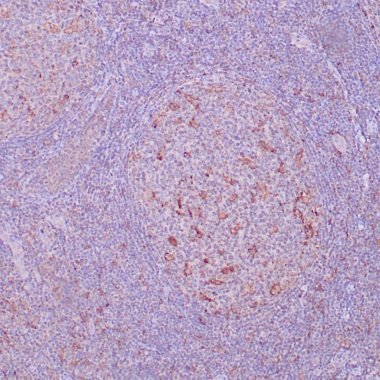
CD205 Antibody (Mouse Monoclonal) – High-Specificity Dendritic Cell Marker for Immunology and Cancer Research The CD205 antibody (mouse monoclonal) is a highly specific antibody designed to detect CD205 (DEC-205), a type I transmembrane C-type lectin receptor predominantly expressed on dendritic cells (DCs), including conventional and plasmacytoid DC subsets, as well as certain thymic epithelial cells. This antibody clone offers robust and reproducible detection of CD205, a key endocytic receptor involved in antigen uptake, processing, and presentation, critical for initiating adaptive immune responses. Validated for applications including immunohistochemistry (IHC) on formalin-fixed paraffin-embedded (FFPE) tissues. CD205, also known as DEC-205 or LY75, is a multifunctional C-type lectin receptor expressed predominantly on professional antigen-presenting dendritic cells and some thymic epithelial cells. It facilitates efficient antigen capture, internalization, and routing to MHC class II compartments, thereby enhancing T-cell priming and immune surveillance. Because of its pivotal role in the immune system, CD205 is extensively studied in contexts including: Dendritic cell biology and immunophenotyping Vaccine development and targeted antigen delivery Autoimmune disease mechanisms Tumor immunology and cancer immunotherapy This mouse monoclonal CD205 antibody is an essential tool for researchers studying the immune response, immune tolerance, and designing novel immunotherapeutic approaches targeting dendritic cells.
Humans; others not tested
Immunohistochemistry (formalin-fixed, paraffin-embedded tissues)
Buffer with protein carrier and preservative
Store at 2ºC to 8ºC
Tonsil
Cytoplasmic
IgG2b /κ
Recombinant fragment (around aa1006-1130) of human LY75 protein